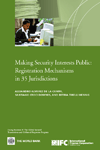Overview
Though the legal and regulatory framework is essential to any secured transactions system, the efficacy of a secured transactions law fundamentally requires an effective registration system for interests in movable property. This report focuses on analysis of such institutions, highlighting the importance of a publicly accessible registry where information on interests in movable assets can be registered. This publication addresses the different registration mechanisms for security interests in movable property and their effectiveness in achieving their goals. It does so using the results of a 2010 World Bank Group survey on collateral registries. It presents examples of international best practices associated with collateral registries and the realities of registration systems in the 35 jurisdictions surveyed.
Main Findings
- More than half of the jurisdiction surveyed still use document registration.
- Among the jurisdictions surveyed, about one-third provide for registration of security interests in the movable assets of incorporated debtors in their Companies Registries, including Hong Kong SAR China, Ireland and Malaysia. In many of these cases, lenders to unincorporated enterprises and individuals have no adequate means of assuring their priority in movable assets due to a lack of a specific registry for security interests granted by these unincorporated enterprises or individuals.
- The form of registry that most incorporates the best practices is a completely electronic one under which registration information is transmitted online and retrieved electronically from the registry database. About a quarter of the jurisdictions surveyed use an exclusively computerized, online system, and do not accept paper registration forms.
- Of the jurisdictions surveyed, one-third permits registration of interests in all or nearly all types of assets. New Zealand, Romania and Canada are among the jurisdictions that accept registrations of interests in all or nearly all types of assets for registration.
- The survey results show an increase in the volume of searches in the majority of the jurisdictions with an electronic database capable of centralizing the information. The volume is also much higher in jurisdictions that count with an electronic database than in those without it.

